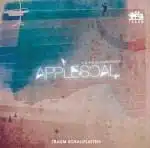
Alongside the other playful and overtly splashy releases from the Traum label in recent months, new producer Applescal is a force. Born Pascal Terstappen, Applescal executes his abstract techno with discernible influences who linger in the acid-washed minimal corners of the genre (James Holden, et al.). A Slave’s Commitment reflects an interest in progressive house/techno productions as well as gauzy midtempo electronic. These productions are fitted with lots of development, jumping from jittery glitch to gentle, washed-out psyche, to hard dance music. Despite where you stand on the left-of-center techno scale, there is likely something here for you.
Applescal’s debut album is a stimulating collection of sometimes urgent minimal and slowly cooking bedroom techno. Much energy is spent on strictly dancefloor rhythms on A Slave’s Commitment, but the melodies are plentiful, and the Holland-based producer is reluctant to allow for a moment’s peace. Not unlike Max Cooper’s methodology on the delightfully ornate Symphonica 12-inch that Traum issued a few months ago, Applescal utilizes a spectrum of different tones and clusters of warm software synth sounds. The sonic variety, in structure and general aural appeal, makes for a monster of a record. It packs more bottom-end than Cooper’s spirited tech house (in that respect, perhaps Applescal’s efforts are closer to Ricardo Tobar’s, a frenetic couple of records from him have appeared on both Traum and Border Community) or Booka Shade does, but A Slave’s Commitment is just as soul-stirring, with summery synth loops and a steady stream of chirps buried beneath its prominent chord progressions. Backed by an affinity for the digital tricks dealt by Nathan Fake and Extrawelt, each of these cuts is more out-there than the next.
Swirling field noises find a pattern amid a pounding kick and looped central notes in temperate opener “The History of Love”, which is immediately brighter than “Structural Stage” from his 2007 Untitled Addict EP, but the second entry on A Slave’s Commitment definitely looks back at the title track on his two-year-old work. “Nottingham Hobbits” is drowsy and frequently fuzzy, a la Ochre’s Lemodie or M83, with a slumping midtempo beat and loads of synths. Although there is more in the way of dreamy film score-type stuff here (“Music for Her Ears”), I prefer the more propulsive entries, as Nathan Fake exhibited a mastery over hazy electronica years ago on Drowning in a Sea of Love.
Over the span of 11 minutes, “The Forms of Abstract Life” and “How Heroes Die” offer an explicit portrait of Traum’s perplexing, blissed-out aesthetic with charm and plentiful headphone-prepped dynamics. Applescal slips one array of sparkling chords against another on the former, with slow, gloopy surges creeping in as if he were manipulating them on a turntable. “How Heroes Die” sounds a great deal like Gui Boratto’s 2009 LP in its rainbow-streaked, pop song-inspired grandiosity. After this lively segment rolls to a close, Applescal’s aggressive, breakbeat-driven frenzy “The Red Dress” channels a number of different artists whose presence is otherwise nowhere to be found on A Slave’s Commitment. Outside of Applescal’s remix of Local Daddys’ “Sjeesh Up” — an onslaught of aimless lyrics, narrowly defined tones, and a rigid, steady pace that nearly sullies a really strong run — the surprises here are fascinating, and the tide of melody and distinctive structures delivers in every capacity.
